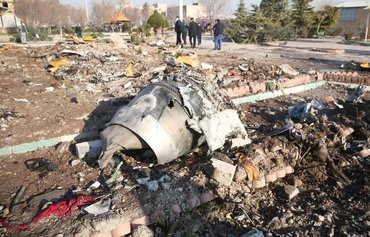TEHRAN -- Iran on Wednesday (March 17) released its final report on the Ukrainian passenger jet that it shot down last year, killing 176 people.
The long-awaited report devoted only two paragraphs to causes and attempted to absolve the armed forces.
A single individual, the air defence operator, erred, causing the tragedy, concluded the report.
On January 8, 2020, Islamic Revolutionary Guard Corps (IRGC) shot down Ukraine International Airlines Flight 752 shortly after take-off from Tehran, firing two ground-to-air missiles at it.
![Rescue teams on January 8, 2020, on the scene of the Ukrainian airliner crash near Imam Khomeini airport in Tehran. The IRGC mistakenly downed the plane. [Akbar Tavakoli/IRNA/AFP]](/cnmi_am/images/2021/03/18/29003-Ukrainian-airliner-IRGC-600_384.jpg)
Rescue teams on January 8, 2020, on the scene of the Ukrainian airliner crash near Imam Khomeini airport in Tehran. The IRGC mistakenly downed the plane. [Akbar Tavakoli/IRNA/AFP]
'Criminals investigating criminals'
On Thursday, the Association of Families of Flight PS752 Victims, which has been vocal about the investigation, harshly criticised the report.
Describing it as the outcome of "criminals investigating their own crimes", the association stated it contains "contradictory claims".
The document is "spreading lies and manufactured claims", it said.
Ukraine, which lost 11 citizens in the disaster, immediately dismissed the report as "a cynical attempt to hide [the] true causes" of the tragedy.
The report is "incomplete and has no hard facts or evidence", said Canada, which lost 55 citizens and 30 permanent residents -- almost all of whom were of Iranian descent.
In a final report of more than 145 pages released in English, the Iranian Civil Aviation Organisation (CAO) devoted two paragraphs to "accident causes and contributing factors".
The first paragraph indicates what was already known, namely that Iranian forces fired "two surface-to-air missiles at the flight PS752 ... (that) led the aircraft to crash into the ground and explode instantly".
The second paragraph examines "other contributing factors", in which it discussed the "alertness" of troops on the ground.
"The mitigating measures and defence layers in risk management proved to be ineffective due to the occurrence of an unanticipated error in threat identifications, and ultimately failed to protect the flight safety against the threats caused by the alertness of defence forces," it read.
The CAO became aware of the downing within minutes but was ordered to remain silent by the IRGC, according to an audio file obtained by BBC Persian July 8.
'Lack of convincing information'
Poor tuning of an anti-aircraft unit's radar was the main "human error" behind the tragedy, the CAO said in July in a progress report, a claim that Ukraine rejected at the time as "too early to conclude".
The tragedy sparked strong condemnation in Iran, especially after it took three days for the armed forces to admit to having shot down the plane "by mistake".
Tehran ignored Ukraine's suggestions, said Ukrainian Foreign Minister Dmytro Kuleba in response to the publication of the final report.
"Ukraine has earlier sent Iran more than 90 pages of remarks and proposals to its draft final report and insisted on Iran including them into the final document," Kuleba said in a statement.
"However, what we saw published today is just a cynical attempt to hide true causes of the downing of our passenger aircraft."
"The report makes no attempt to answer critical questions about what truly happened", said Canadian Foreign Minister Marc Garneau and Transport Minister Omar Alghabra.
"We remain deeply concerned about the lack of convincing information and evidence, despite the publication of this investigation report," they said in a joint statement, underscoring that 138 of the 176 killed in the crash had ties to Canada.
"Their families deserve answers to important questions, including on the series of events that led to these missiles being launched in the first place, and why the airspace was allowed to remain open during a period of heightened hostilities."
Ottawa soon will release the results of its own investigation, it has stated.
Canada will continue to seek answers and ensure that Iran "takes full responsibility and makes full reparations" to the families and loved ones of the victims, said Garneau and Alghabra.

![Demonstrators hold signs with images of the victims of the downed Ukraine International Airlines Flight 752, which was shot down near Tehran by Iran's IRGC, as family and friends gather to take part in a march to mark the first anniversary, in Toronto, Canada, on January 8. [Cole Burston/AFP]](/cnmi_am/images/2021/03/18/29010-iran-ukraine-report-600_384.jpg)






